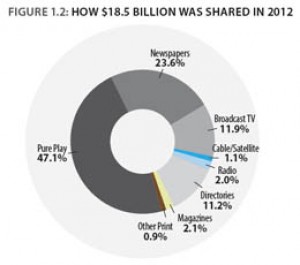A word of warning to local chambers of commerce, Rotary Clubs, United Ways and other groups and organizations that care about and work on behalf of local communities: Internet pureplays are stealing money from your city’s coffers.
Let me explain.
Here is the latest data from Borrell Associates. The chart shows just who is earning the money that local businesses are spending to advertise online.

Note that the market is $18.5 billion, and the majority goes to what are called Internet pureplay companies and directory companies. The important fact here is that most communities will never benefit from this commerce. These pureplays exist outside the borders of most local communities, meaning they pay no taxes, usually employ no residents and do not participate in the community chest. In other words, well over half of all the money from your community that is spent for online advertising goes to pockets that live elsewhere. And these numbers aren't small.
Here are six examples gleaned from Borrell's 513 Digital Marketing Regions (DMRs) representing different market sizes. Numbers are estimates based on national averages. Even in small places, the actual dollars leaving the community via Internet advertising are staggering.
| DMR | Total Online | Outside DRM |
|---|---|---|
| Dallas/Fort Worth, Texas | $667,660,000 | $389,245,780 |
| Erie, Pa. | $25,100,000 | $14,633,300 |
| Eureka, Calif. | $5,740,000 | $3,346,420 |
| Los Angeles, Calif. | $1,241,070,000 | $723,543,810 |
| Myrtle Beach/Florence, S.C. | $39,910,000 | $23,267,530 |
| Victoria, Texas | $7,150,000 | $4,168,450 |
So if you're the director of the chamber in Myrtle Beach, you're concerned that roughly $23 million from your market is leaving the market with the only possible benefit being that it might lift the business of some of your local members. If you're the executive director of the United Way in Los Angeles, you ought to be very concerned that not a dime of that $723 million is contributed to your causes.
Companies like Google, Yahoo, Reach Local, Groupon, Autotrader, Zillow and a whole host of others bring a value proposition that they can pinpoint individual browsers in a market — and the eyeballs staring at those browsers — to help local businesses target their customers. Local businesses need the help they provide, but in addition to removing cash from their markets, they're also walking away with all the behavioral data gathered from those browsers, which just helps them get better and bigger.
This is happening for two reasons. One, these companies have spent the money necessary to create the technology that delivers their promises. Two, the big advertising venues in local markets that do pay taxes, employ people and contribute to the community chest — in other words, the legacy media companies — do not have the technology or tools necessary to compete with these outsiders. We can do little about the first one, but the second can and must change.
Every local business should be encouraged to look at what the old, reliable companies in their communities offer and, more important, to not be afraid to try new things that they might bring to the table in order to reverse the drain.
To paraphrase Ross Perot, the giant sucking sound you're hearing is the businesses in your market winning the battle but losing the war.





